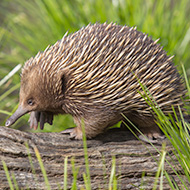Echidna study reveals heat management techniques

Researchers identified a novel evaporative window in echidnas.
A study from Curtin University, Australia has found that echidnas have special techniques to manage heat, including blowing bubbles to wet their nose tip.
In doing this, the moisture then evaporates and cools the echidnas blood. This is one of the several techniques that researchers observed.
Published in Biology Letters, the study is titled 'Postural, pilo-erective and evaporative thermal windows of the short-beaked echidna'.
Researchers took thermal vision footage of wild short-beaked echidnas in bushland and studied this to see how they exchanged heat with their environment.
Dr Christine Cooper, lead author of the study, explained: “We observed a number of fascinating methods used by echidnas to manage heat and which allow the animal to be active at much higher temperatures than previously thought.
“Echidnas blow bubbles from their nose, which burst over the nose tip and wet it. As the moisture evaporates it cools their blood, meaning their nose tip works as an evaporative window.”
The research team also found that the spines on echidnas provide flexible insulation to retain body heat. Echidnas can lose heat from the spineless areas on their underside and legs, so these areas work as thermal windows to allow heat exchange.
Dr Cooper continued: “Echidnas can’t pant, sweat or lick to lose heat, so they could be impacted by increasing temperature and our work shows alternative ways that echidnas can lose heat, explaining how they can be active under hotter conditions than previously thought.
“Understanding the thermal biology of echidnas is also important to predict how they might respond to a warming climate.
“Our work highlights how technological advances that allow for non-contact study of animal physiology, such as the thermal vision used in this study, can give us a better understanding of the physiological capacity of animals in their natural environment.”



 The latest
The latest